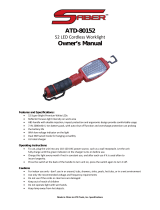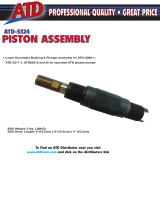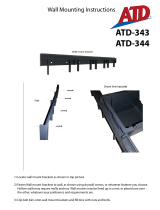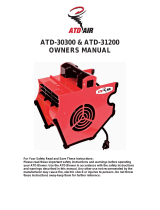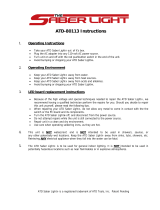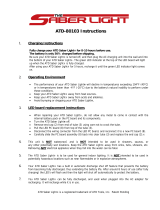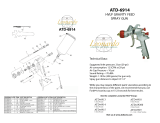Page is loading ...

ATD Actuator
®
Operating and Installation Instructions
Milwaukee Protective Covers
2300 South Calhoun Road
New Berlin, WI 53151
Phone: 414-906-4000
Fax: 414-906-4100
© 1998 Milwaukee Protective Covers
V2.0
www.MPCovers.com
Automatic Door Drive
Model 50 ATD-313186

ATD 50 Actuator
®
Operating Instructions
Page 2
3811 N. Holton Street • Milwaukee, WI • 53212 •USA • Phone • 414-906-4000 • Fax 414-906-4100 • www.MPCovers.com
Contents
1 Explanation of symbols .................................................4
2 General Safety Instructions ..........................................4
2.1 Correct Use .....................................................................5
2.2 Design and Installation Personnel Requirements.....5
2.3 General Information and MPC™ Liability...................5
3 Theory of Operation.......................................................6
4 Design Information.........................................................7
4.1 Mechanical ......................................................................7
4.1.1 The Door..........................................................................7
4.1.2 Installation Position........................................................7
4.1.3 Installation.......................................................................8
4.2 Electrical..........................................................................9
4.2.1 Main Power Connection................................................9
4.2.2 Control Connection ..................................................... 10
5 Start-up Procedure...................................................... 10
5.1 Preparation................................................................... 10
5.2 Start-up ......................................................................... 11
6 Check List for Functional Tests................................. 11
7 Error Diagnosis............................................................ 13
8 Hardware Error Displays ............................................ 14
9 Standard Input Functions ........................................... 15
10 Standard Output Functions ........................................ 17

ATD 50 Actuator
®
Operating Instructions
Page 3
3811 N. Holton Street • Milwaukee, WI • 53212 •USA • Phone • 414-906-4000 • Fax 414-906-4100 • www.MPCovers.com
11 Operation...................................................................... 19
11.1 Calibration Run............................................................ 19
11.2 Door Movements......................................................... 20
11.3 Reversing Motion........................................................ 20
12 Memory and System Layout...................................... 21
13 Technical Data.............................................................. 22
14 Electrical Wiring Diagram........................................... 24
15 Physical Dimensions................................................... 25
16 Trouble Shooting Guide......................................... 26

ATD 50 Actuator
®
Operating Instructions
Page 4
3811 N. Holton Street • Milwaukee, WI • 53212 •USA • Phone • 414-906-4000 • Fax 414-906-4100 • www.MPCovers.com
1 Explanation of symbols
This symbol warns of general hazards and of possible damage to the equipment.
This symbol warns of dangerous electrical voltages or current
2 General Safety Instructions
Before beginning installation or start-up, read and follow these
instructions. Damage to the unit and personal injury may result
from not following these instructions.
Keep fingers away from all moving parts. Be especially careful to install guards or shield
to protect personnel from the moving drive belt and pulleys.
• Be sure the electrical power is disconnected and locked-out when working
on the ATD 50 Actuator
®
.
• Install the electrical cables and power only after the mechanical installation of the
unit.
• Turn on the power to the ATD 50 Actuator
®
only after all internal cables are
connected. Do not connect cables while the unit is powered.
• Always use the correct tools for installation and repair.

ATD 50 Actuator
®
Operating Instructions
Page 5
3811 N. Holton Street • Milwaukee, WI • 53212 •USA • Phone • 414-906-4000 • Fax 414-906-4100 • www.MPCovers.com
2.1 Correct Use
The ATD 50 Actuator
®
is designed for operating automatic doors on machine tools
and industrial equipment. It is intended to automatically open and close doors,
detect obstructions, and hold the door when closed. Vertical doors must be
installed using a counter-weight system since the ATD 50 Actuator
®
is not intended
to lift or hold the weight of a door.
Any other use for the ATD 50 Actuator
®
is the judgement and risk of the installer.
The brake on the ATD 50 Actuator
®
is intended to help prevent
accidental opening of the door. The brake is not an absolute
positive lock and can be overcome by a strong pull of the door.
The machine designer and/or installer must decide if additional
positive latches are required to insure proper machine safety.
Use the ATD 50 Actuator
®
system only when it is operating properly and as
designed. Any problems or malfunctions should be repaired immediately. The
safety systems of the ATD 50 Actuator
®
unit depend upon correct operation.
2.2 Design and Installation Personnel Requirements
The design and installation of the guard door system, including the ATD 50
Actuator
®
must be completed by qualified personnel with training and experience in
the area of power-operated doors. The personnel must be familiar with relevant
work safety regulations, accident prevention guidelines, and generally accepted
technical practices.
2.3 General Information
The operating, maintenance, and installation instructions provided by Milwaukee
Protective Covers must be observed. The drive must be maintained and repaired
only by qualified technicians who are familiar with the ATD 50 Actuator
®
and have
been instructed about the possible dangers.
2.3 continued on next page

ATD 50 Actuator
®
Operating Instructions
Page 6
3811 N. Holton Street • Milwaukee, WI • 53212 •USA • Phone • 414-906-4000 • Fax 414-906-4100 • www.MPCovers.com
2.3 General Information (cont.)
The purchaser, designer, and/or installer is responsible to insure the correct and
safe application of the ATD 50 Actuator
®
. These personnel must insure that all
Federal, State, and Local laws and regulations regarding workplace safety are
observed. OSHA and other safety regulations must be observed when completing
an installation.
Milwaukee Protective Covers is not responsible for incidental and/or consequential
damages resulting from the use or application of the ATD 50 Actuator
®
. Our
maximum liability under warranty is for only the cost of the product sold. Milwaukee
Protective Covers makes no claims for merchantability or fitness of use for specific
machine guarding applications. The purchaser, designer, and/or installer of the
ATD 50 Actuator
®
must decide if the drive is applicable to a given machine
application. In addition, Milwaukee Protective Covers specifically declines any
responsibility for damage or injury resulting from unauthorized changes to the drive,
including software parameter changes. No employee of Milwaukee Protective
Covers is authorized to modify this warranty without the specific written approval of
a company officer.
3 Theory of Operation
The ATD 50 Actuator
®
is controlled using a built-in microprocessor computer. The
microprocessor is programmed to provide optimum motion control and safe
response to obstructions. Internal parameters can be changed by authorized
service personnel to customize the installation. The software can be modified for
each installation.
The ATD 50 Actuator
®
is completely self-calibrating. Upon power-up, the unit
automatically adjusts to the opening width of the machine. During the OPEN and
CLOSE motion, the unit finds the end-stop positions of the door. Therefore, the
door width is not limited in any way.
The internal drive motor is operated by a variable frequency converter which
provides the optimal speed and torque for each movement. The motor speed and
torque are continuously monitored thereby providing a sensitive and accurate
electronic reversing feature ( see Section 11.3).

ATD 50 Actuator
®
Operating Instructions
Page 7
3811 N. Holton Street • Milwaukee, WI • 53212 •USA • Phone • 414-906-4000 • Fax 414-906-4100 • www.MPCovers.com
4 Design Information
4.1 Mechanical
All components in the system must be designed and installed to withstand the
forces produced by the system. This includes the door itself, all mounting brackets,
the idler pulley, the connector between the door and belt, and the door end stops.
Maximum tensile force of the belt 30 lbs (130 N)
Weight of the ATD 50 Actuator
®
unit 31 lbs (14Kg)
4.1.1 The Door
The door must have fixed positive stops at each end of travel. The stops must be
able to withstand the maximum pressure of the driving force (30 lbs /130 N).
Smooth door movement is the most important criteria to insure correct operation.
The door should have a consistent drag force over its complete travel. The door
guides should provide as low a drag resistance as possible. This will insure
trouble-free operation and will increase the drives’ sensitivity to any obstructions.
4.1.2 Installation Position
The ATD 50 Actuator
®
can be installed in any position and any orientation
according to the specific application. The drive belt, idler pulley, and ATD 50
Actuator
®
should be installed so that the moving parts do not touch or rub on any
other part of the machine. Also, the drive pulley and idler must be properly aligned
to insure correct belt travel. Failure to align the drive belt properly will result in
excessive belt wear and shortened belt life.
The ATD 50 Actuator
®
unit and the drive belt should be installed outside the area of
contamination. If the unit must be installed inside the area of contamination, the
drive belt must be protected from chips, coolants, or other debris.

ATD 50 Actuator
®
Operating Instructions
Page 8
3811 N. Holton Street • Milwaukee, WI • 53212 •USA • Phone • 414-906-4000 • Fax 414-906-4100 • www.MPCovers.com
4.1.3 Installation
The ATD 50 Actuator
®
internal frame is mounted into the metal enclosure with 6
screws. (There are two screws on the back of the unit and four button-head cap
screws on the top.) For installation, only the four screws on the top OR the two
screws on the back should be used.
Never loosen all 6 screws at the same time! Otherwise the internal frame will be
loose inside the metal housing. If the internal frame is allowed to move inside the
metal housing, the drive shaft can be damaged by scraping against the sealing
elements.
Under no circumstances should the large hexagonal screw on the drive pulley
be loosened!

ATD 50 Actuator
®
Operating Instructions
Page 9
3811 N. Holton Street • Milwaukee, WI • 53212 •USA • Phone • 414-906-4000 • Fax 414-906-4100 • www.MPCovers.com
4.2 Electrical
Internal View of ATD 50 Actuator¨
4.2.1 Main Power Connection
The main power supply can be switched between 115 volts and 230 volts and with 50
or 60 Hz AC power. There is an internal switch on the main power connection to
select 115V or 230V.
The main power must be externally protected with a 10 amp fast-blow fuse and
a system disconnect.
Verify that the power selection switch is set to the correct voltage before start-up!

ATD 50 Actuator
®
Operating Instructions
Page 10
3811 N. Holton Street • Milwaukee, WI • 53212 •USA • Phone • 414-906-4000 • Fax 414-906-4100 • www.MPCovers.com
4.2.2 Control Connection
The ATD 50 Actuator
®
has a versatile microprocessor controller that interfaces with
the machine control unit. The parameters are factory-set. However, a
knowledgeable service technician can change the parameter settings using the
Microsoft Windows
®
‘95 based SERsoft programming software.
Inputs
An input is activated when an input terminal (IN) is connected to ground (GND).
This connection must be made using potential-free contacts. No external power
supply must be used to activate inputs.
Outputs
Six (6) potential free output relays are provided. Three (3) relays are wired as
normally open and three (3) are wired as normally closed. (See page 24)
5 Start-up Procedure
5.1 Preparation
Prepare the ATD 50 Actuator
®
by completing the following steps:
• Mount the drive box on a rigid base in a suitable position.
• Install the idler pulley to a rigid base on the machine.
• Cut the drive belt to length and splice together using the supplied clamp.
• Tension the drive belt by adjusting the idler pulley.
• Connect the drive belt to the door by fixing a bracket from the clamp to the door.
End-user must supply their own bracket.
• Verify that the door runs freely to both end-stops.
• Connect the input and output control cables and attach to the machine controller.
• Connect the main power cable. Do not apply power at this time!
The drive is now ready!

ATD 50 Actuator
®
Operating Instructions
Page 11
3811 N. Holton Street • Milwaukee, WI • 53212 •USA • Phone • 414-906-4000 • Fax 414-906-4100 • www.MPCovers.com
5.2 Start-up
• Check the main power voltage selection switch for proper supply voltage (230V /
115V)
• Check the control connections and verify they are correctly installed
Beware of Electrical Voltages!
• Switch on the main power supply to the drive.
• Start the calibration run (see section below).
• Check and test all functions to be used.
• If required, re-adjust door-specific parameters (opening and closing speeds,
braking distance, etc.) using the SERsoft programming software.
• Test the complete system.
6 Check List for Functional Tests
During the functional tests the door travel path must be free of obstructions. The only
limits to door travel should be the two end-stops. Test the unit according to the
following steps:
TEST 1: POWER-UP
ACTION: Energize the main power to the ATD 50 Actuator
®
EXPECTED BEHAVIOR: No door movement.
Green LED on the Control Board illuminates.
Door is freely moveable.
No errors displayed on LED’ at terminals D5 - D9 (if
installed).
No errors displayed in the SERsoft Diagnostic Display.
TEST 2: CALIBRATION RUN
ACTION: Apply momentary or maintained contact between OPEN
input (A2) and Ground (A1).
EXPECTED BEHAVIOR: Door moves slowly to open position and pushes against
end-stop.
Open position is now set in the microprocessor.
ACTION: Apply momentary or maintained contact of CLOSE input
(A7) and Ground (A1).
EXPECTED BEHAVIOR: Door moves slowly to closed position and pushes
against end-stop.
Closed position is now set in the microprocessor.

ATD 50 Actuator
®
Operating Instructions
Page 12
3811 N. Holton Street • Milwaukee, WI • 53212 •USA • Phone • 414-906-4000 • Fax 414-906-4100 • www.MPCovers.com
6 Check List for Functional Tests (cont.)
TEST 3: OPTIMIZE MOVEMENTS
ACTION: Operate the door for two (2) complete open and close
movements.
EXPECTED BEHAVIOR: Door should open and close normally. The
microprocessor measures the torque and sets the
internal speed and torque references. These references
are used as safety thresholds for detecting obstructions.
NOTE: The safety reversing function is not active
during the first two (2) open and close cycles!
See Sec. 11.1.
TEST 4: CHECK ALL FUNCTIONS
ACTION: Activate all connected functions and options such as
CNC, PLC, pushbuttons, photoeyes, etc.
EXPECTED BEHAVIOR: Door should operate normally per feature definitions.

ATD 50 Actuator
®
Operating Instructions
Page 13
3811 N. Holton Street • Milwaukee, WI • 53212 •USA • Phone • 414-906-4000 • Fax 414-906-4100 • www.MPCovers.com
7 Error Diagnosis
There are 10 error conditions that can be detected by installing LED’s to specific “B
TERMINAL STRIP” outputs inside the ATD 50 Actuator
®
.
The errors are indicated
according to the following code:
Software Error Number
2 Calibration run is taking place. Wait until door is closed for error to clear
3 Main power failure.
9 Microprocessor error or drive type not specified. Contact Factory.
10 Emergency stop activated.
11 Motor overheated. Allow motor to cool for reset or Contact Factory.
12 Power module faulty or low mains voltage.
13 No movement is detected from the door. Possibly the encoder, cable,
motor, or belt is defective. Door is possibly blocked.
16 Door is in reversing mode because it has encountered an obstruction.
Wait until door is closed.
29 External reversing on closing.
30 External reversing on opening.
NOTE: The software errors can also be detected using the SERsoft programming
software. The errors are displayed in the Error Window in the Diagnostic Menu.

ATD 50 Actuator
®
Operating Instructions
Page 14
3811 N. Holton Street • Milwaukee, WI • 53212 •USA • Phone • 414-906-4000 • Fax 414-906-4100 • www.MPCovers.com
8 Hardware Error Displays
The microprocessor controller has a red and green LED light in the lower right corner.
The LED lights indicate the general status of the microprocessor.
GREEN LED
The microprocessor controller is operating correctly.
RED LED
Any of the following conditions:
• A software error is detected
• The emergency stop is active
• E-Stop Jumper connection between terminals D1 & D2 is missing
• The motor is overheated
• Controller Failure

ATD 50 Actuator
®
Operating Instructions
Page 15
3811 N. Holton Street • Milwaukee, WI • 53212 •USA • Phone • 414-906-4000 • Fax 414-906-4100 • www.MPCovers.com
9 Standard Input Functions
The ATD 50 Actuator
®
can accept either momentary or maintained contacts. The factory
default is momentary. If additional safety requirements are desired, you can specify
MAINTAINED CONTACT for the input signals. Maintained Contact Signals can be
programmed in the Basic Functions Menu in the SERsoft programming software.
If you desire to use maintained contacts for input signals, we suggest using the
following logic in your PLC or CNC:
The error signals for All Errors (General Error 1 - Relay 1 - E1 to E2) and
General Errors (General Error 2 - Relay 4 - E7 to E8) are activated during
calibration runs. The maintained contact can be held until the errors clear. In
this situation, the machine controller can monitor Relay 1 or 2 and maintain
the inputs to A2 and A7 until the errors clear.
OPEN
This command will move the door to the full open position.
Input terminal: A2
Type of signal: Momentary or maintained contact A2 to Ground A1.
Active level Connection is normally open.
Close connection to activate.
Calibration run: After a software reset or a loss of main power, the first
portion of the calibration run is started with this command.
CLOSE
This command will move the door to the closed position.
Input terminal: A7
Type of signal: Momentary or maintained contact A7 to Ground A1.
Active level Connection is normally open.
Close connection to activate.
Calibration run: After a software reset or a loss of main power, the second
portion of the calibration run is started with this command.
The calibration run is completed when the door reaches the
closed position.

ATD 50 Actuator
®
Operating Instructions
Page 16
3811 N. Holton Street • Milwaukee, WI • 53212 •USA • Phone • 414-906-4000 • Fax 414-906-4100 • www.MPCovers.com
REDUCED OPEN
This command causes the door to open to a preset position from the closed position only.
Reason for use: This command is used when a completely opened door is not
required. (Operator may wish to access inside of machine briefly).
Input terminal: C4
Type of signal: Momentary or maintained contact C4 to Ground A1.
Active level Connection is normally open.
Close connection to activate.
FREE WHEEL
This command releases the internal brake allowing manual door movement.
Reason for use: This command will release the brake and allow the operator to
manually move the door. While this signal is present, no other
command will be carried out.
Input terminal: C7
Type of signal: Momentary or maintained contact C7 to Ground A1.
Active level Connection is normally open.
Close connection to activate.
REVERSE CLOSING
This command reverses the door movement when closing. The door will reverse direction
and move to the full open position.
Reason for use A secondary safety device such as a ribbon switch or light curtain can
be installed into the system. The secondary device would be wired
into this command to give a faster REVERSE signal. This is
independent from the automatic sensing feature.
Input terminal: C9
Type of signal: Momentary or maintained open contact C9-to-Ground A1.
Active level Connection is normally closed.
Open connection to activate.

ATD 50 Actuator
®
Operating Instructions
Page 17
3811 N. Holton Street • Milwaukee, WI • 53212 •USA • Phone • 414-906-4000 • Fax 414-906-4100 • www.MPCovers.com
SET REDUCED OPEN POSITION
This command sets the reduced door open position.
Reason for use: The reduced open position can be manually set by using the input
command at terminal F2. You must be able to manually move the
door to the desired position before activating this input command.
The distance can be set using the SERsoft programming software.
Input terminal: F2
Type of signal: 1 second contact of F2 to Ground F1.
Active level Connection is normally open.
Close connection to activate (program the position).
EMERGENCY STOP
This command will instantly stop all door movement.
Reason for use: To interface to your machine’s E-stop circuit.
Input terminal: D1 & D2
Type of signal: Momentary or maintained open between D1 and D2.
Active level Connection is normally closed.
Open connection to activate (stop door movement).
10 Standard Output Functions
The output signals are connected to the six (6) relays inside the ATD 50 Actuator
®
GENERAL ERROR 1
This output contains all error messages with the exception of the
internal and external reversing motions. This means any problem
except an obstruction is present in the door path. (Error numbers 16,
29, & 30 are not active).
Output terminal: E1 & E2 (Relay 1).
Active level: Contact is normally open (no error).
Closed contact when activated (error present)

ATD 50 Actuator
®
Operating Instructions
Page 18
3811 N. Holton Street • Milwaukee, WI • 53212 •USA • Phone • 414-906-4000 • Fax 414-906-4100 • www.MPCovers.com
REVERSING ERROR / GENERAL ERROR 2
This output is active when the internal and external reversing motions
are initiated, usually due to an obstruction. (Error numbers 16, 29, or
30 active).
Output terminal: E3 & E4 (Relay 2).
Active level Contact is normally open (no error).
Closed contact when activated (error present).
DOOR POSITION IS CLOSED
This output is active when the door is in the closed position ± 1/8 inch.
The output is active also when the door is manually moved to the
closed position.
Output terminal: E5 & E6 (Relay 3).
Active level Contact is normally open.
Closed contact when activated.
DOOR POSITION OPEN
This output is active when the door is in the open position ± 1.5 inch.
The output is active also when the door is manually moved to the
open position.
Output terminal: I1 & I2 (Relay 4.)
Active level Contact is normally closed.
Open contact when door is in the full open position.
DOOR IS CALIBRATED
This output is active when the door has been calibrated and is ready
for normal operation.
Output terminal: I3 & I4 (Relay 5).
Active level: Contact is normally closed.
Open contact when door is calibrated.
Door at Reduced Open Position
This output is active when the door has reached the Reduced Open
Position or when the door is in the full open position.
Output terminal: 5 & I6 (Relay 6.)
Active level: Connection is normally closed.
Open connection when activated.

ATD 50 Actuator
®
Operating Instructions
Page 19
3811 N. Holton Street • Milwaukee, WI • 53212 •USA • Phone • 414-906-4000 • Fax 414-906-4100 • www.MPCovers.com
11 Operation
11.1 Calibration Run
The first movements after a power-up or system reset are the self-calibration
reference moves. The door travels to each end-stop and records the distance
traveled and torque needed for movement. The door can be freely moved before a
Calibration Run.
NOTE: The automatic reversing feature is disabled during the calibration cycles!
The calibration cycle must be started by the external input signals. The calibration
steps are:
1. Power-up or system reset erases the previous calibration.
2. An OPEN signal must be given to the ATD 50 Actua tor
®
by a momentary or
maintained contact from A2 to Ground A1.
3. The door moves slowly to the extreme open end-stop. It pushes against the end-
stop with full force, then stops. The open position is now set.
4. A CLOSE signal must be given to the ATD 50 Actuator
®
by a momentary or
maintained contact from A7 to Ground A1.
5. The door moves slowly to the extreme closed end-stop. The door pushes against
the end-stop with full force, then stops. The door closed position is now set.
The door must contact the end-stop using the ATD 50 Actuator
®
power. If the door
is interrupted during the calibration cycle, the calibration procedure must be
repeated. The calibration cycle must begin with an “OPEN” signal followed by a
“CLOSE” signal.
During the calibration run, the drive runs with full torque. The
safety reverse feature is disabled and the internal reversing
motion is not active!
It is imperative that the machine designer and installer notify all machine operators
that the reversing safety feature is not active during the first two OPEN and CLOSE
motions after power-up or system reset. During these first movements the ATD 50
Actuator¨ automatically calibrates itself to determine the required reference torques.
Any obstruction is interpreted as “normal” by the controller and is recorded as the
required torque at that point of travel.

ATD 50 Actuator
®
Operating Instructions
Page 20
3811 N. Holton Street • Milwaukee, WI • 53212 •USA • Phone • 414-906-4000 • Fax 414-906-4100 • www.MPCovers.com
11.2 Door Movements
• The input signals for OPEN, CLOSE and REDUCED OPEN can be given as
momentary or maintained contacts.
• The door moves freely when in the open position. When open, the drive waits for
the next input command signal.
• The door is locked with an internal brake ONLY when in the closed position. When
closed, the door waits for the next input command. The brake can be released by
giving a FREE WHEEL command using input A1 to C7 or an OPEN command
using input A1 to A2.
• If the door is opened to the reduced position, it can be fully opened with the OPEN
command or closed and locked with the CLOSE command.
11.3 Reversing Motion
Obstructions are detected using three variables: 1) Stall Time 2) Speed and 3)
Motor Torque. An obstruction is assumed if 1) The door stalls for more then one
second, 2) The speed of travel is slower than a predetermined threshold, and 3)
The torque needed is greater than the reference torque.
If an obstruction is encountered during a CLOSE movement, the door reverses
direction and moves to the full open position. The ATD 50 Actuator
®
waits until it
receives a new CLOSE command.
If an obstruction is encountered during an OPEN movement, the door reverses
direction, moves about one inch (25 mm) away from the obstruction and stops.
The ATD 50 Actuator¨ waits until it receives a new command.
During the next motion after encountering an obstruction, the door moves at 50%
speed toward the obstruction point. The motor torque variable is disabled during
this “second attempt”. Therefore, the ATD 50 Actuator
®
is less sensitive to an
obstruction. If no obstruction is encountered, then the motion continues as normal
and the three variables are monitored again.
/
